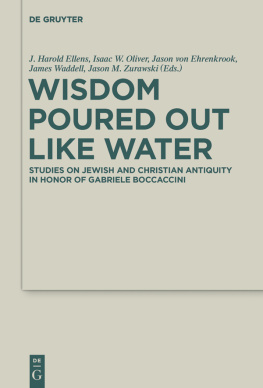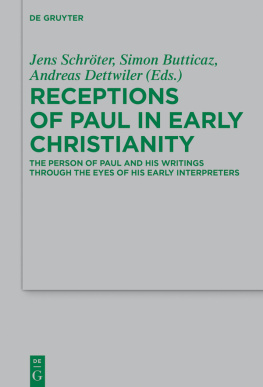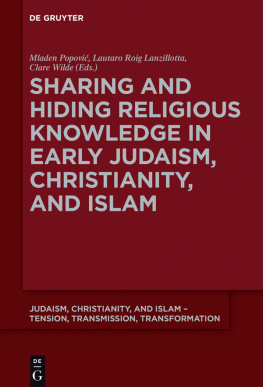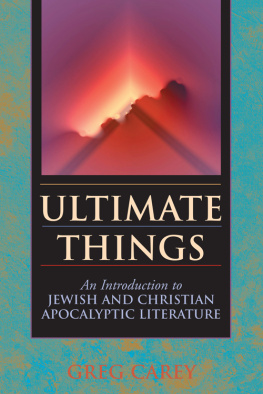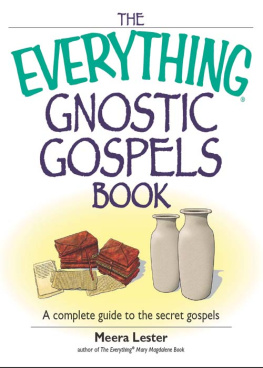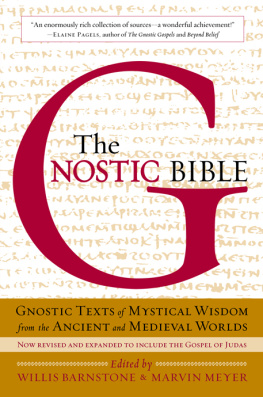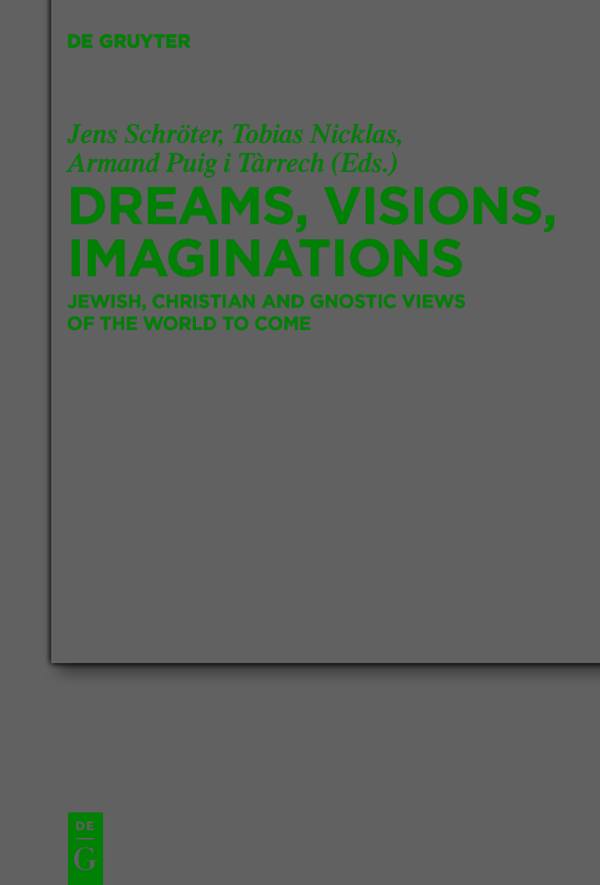Beihefte zur Zeitschrift fr die neutestamentliche Wissenschaft
Edited by
Matthias Konradt
Erich Grer
Richard B. Hays
Judith Lieu
Laura Nasrallah
Jens Schrter
Gregory Sterling
Carl Holladay
Hermann Lichtenberger
James D. G. Dunn
Michael Wolter
Volume
ISBN 9783110713527
e-ISBN (PDF) 9783110714746
e-ISBN (EPUB) 9783110714777
Bibliographic information published by the Deutsche Nationalbibliothek
The Deutsche Nationalbibliothek lists this publication in the Deutsche Nationalbibliografie; detailed bibliographic data are available on the Internet at http://dnb.dnb.de.
2021 Walter de Gruyter GmbH, Berlin/Boston
Introduction
Jens Schrter
Tobias Nicklas
The contributions in this volume go back to a conference on Dreams, Visions, Imaginations: Jewish, Christian and Gnostic Views of the World to Come. The meeting which took place 9th11th May 2019 in Barcelona, Catalunya, was organized as a cooperation between the Ateneu Universitari Sant Paci Barcelona, the Chair of New Testament and New Testament Apocrypha at Humboldt-Universitt zu Berlin, Germany, and the Centre for Advanced Studies Beyond Canon at Universitt Regensburg, Germany.
The conference focused on the historical origins, religious provenance, and social function of ancient Jewish and Christian apocalyptic literature, including so-called Gnostic writings. To facilitate emphasis on these thematic spectra, participants were issued the following prompt prior to the preparation of their contributions: Although it is disputed whether there was a genre of apocalyptic literature, it is obvious that numerous texts from ancient Judaism, early Christianity, and other religious milieus share a specific view of history and the world to come. Many of these writings are presented in form of a heavenly (divine) revelation, mediated through an otherworldly figure (like an angel) to an elected human being who discloses this revelation to his recipients in written form. This description invokes John J. Collinss influential definition of apocalypse which was first formulated in Semeia 1979,
In different strands of ancient Christianity as well as in Gnosticism, Manichaeism, and Islam, apocalyptic writings played an important role from early on and were produced also in later centuries. One of the most characteristic features of these texts is their specific interpretation of history, based on the knowledge about the upper, divine realm and the world to come. In many of these writings history is viewed from a heavenly viewpoint, or from an end-time perspective. This implies that the seer or prophet is given the privileged position to look on the entire history from a divine point of view. Often associated with this view is a description of the final judgment with the separation between righteous and sinners and the advent of another, glorious world which will replace the current world. As has often been noted, apocalyptic views of history are related to certain political and social situations in ancient Judaism: several (although hardly all) of these apocalyptic writings are closely connected with the dispersion of the Jewish people after the Babylonian exile and the oppression by the Seleucids. However, apocalyptic writings should not strictly be regarded as reactions to certain historical circumstances and interpreted as resistance literature. Such an approach cannot explain why apocalyptic views of history were prominent and widespread also in various strands of ancient Christianity and emerged in other religious milieus as well.
Against this general background the conference focused on the following questions in particular:
Why were apocalyptic writings produced at all?
Why did apocalyptic interpretations of history originate in Second Temple Judaism, in early Christianity, and in Gnostic writings, in addition to Greco-Roman religion, in Manichaeism, and early Islam?
How can the view on history developed in these writings be described in more detail?
Does the relationship between the upper world and the earthly realm as it is described in these writings point to a common worldview in different religious milieus?
Has the apocalyptic imagination remained attractive through today because it provides an idea about eternal reward and punishment and the final victory of divine justice?
What does it mean for contemporary interpretation and usage of apocalyptic texts that a significant number of them contain violent or even brutal descriptions of the devastation of the contemporary world and the punishment of whoever does not obey the will of God?
As far as we can see, the following main ideas and theses emerged from the meeting. While certainly not all of them were shared or even addressed by every speaker, they seem to be especially fruitful for future discussions of the topic:
(1) While the roots of Jewish apocalypticism are often analyzed via the religious-historical background of the texts in question, such analysis also sets a special emphasis on the concrete historical contexts which influenced the development of worldview and related genre(s).
(2) In order to properly understand the apocalyptic writings, we have to consider their specific concepts of time and history, concepts which often differ radically from our ideas of time.
(3) While it is true that many apocalypses describe past events and seem to focus on the future for example, the inevitable divine judgment their main interest is to challenge ideas about the present times of their intended audience(s).
(4) While confessional categories such as Jewish, Christian, Islamic and the like often do not help to distinguish between different groups of apocalyptic writings, the analysis of certain recurring motifs or figures (as e.g., the figure of Ezra) may help to distinguish between streams and describe clusters of apocalyptic writings.
(5) The fact that many apocalyptic writings are concerned with deeply relevant questions and/or employ impressive, memorable imagery may have contributed to the phenomenon that (clusters of) motifs related to apocalyptic writings survived far beyond the transmission of the original texts and in different medial forms (like image and ritual).
(6) Apocalyptic worldviews are not restricted to writings which belong to the genre apocalypse in a strict sense. Instead, the boundaries between the historical, chronographical, and apocalyptic genres may be more permeable than is often assumed. At the same time, not every text which is labelled as apocalypse by its title shows an apocalyptic worldview.
(7) While most of the Jewish apocalyptic writings of the Second Temple period may be described as resistance literature produced in circles that considered themselves marginalized, this is not necessarily the case for later periods.
(8) Apocalyptic writings can be perceived as texts written, at least in part, by highly educated scholarly circles. This, however, does not exclude the possibility that at least in some cases they also try to describe specific religious experience(s).
By way of conclusion, we wish to express our thanks to the many people who have made the conference and this volume possible. We are grateful for the generous financial support we received from the German Research Foundation (DFG) which finances the Centre of Advanced Studies Beyond Canon at Universitt Regensburg. Many people made this meeting possible first and foremost our young New Testament colleague at Barcelona, Marcus Aceituno Donoso, and the wonderful staff at the Ateneu Universitari Sant Paci. We would like to thank Dr. Stephanie Hallinger and Ulrike Linder-Windbichler from the Regensburg Centre for their help in organizing the conference. We are grateful to Janina Skra, Alexandra Priesterath, Konrad Schwarz and Sophie Rink who have prepared the manuscript for publication. Last but not least, we want to thank the editors of the renowned


